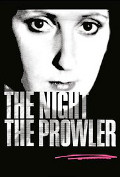
Directed by
Jim Sharman
85 minutes
Rated M
Reviewed by
Bernard Hemingway

The Night Prowler
Based on a short story by Patrick White, who also wrote the screenplay, The Night, The Prowler is not a film that speaks to the mainstream and it was critically pilloried when debuted at the 1978 Sydney Film Festival.It tells the story of Felicity Bannister (Kerry Walker), a plain and plump young woman who lives in upperish middle class suburbia of North Sydney with her over-bearing, social climbing mother (Ruth Cracknell) and sub-dominant father (John Frawley). As the film opens it seems that Felicity has been molested by a nighttime intruder. Whilst the mother revels in the salaciousness of it all, Felicity uses the incident to break off her engagement with her boring diplomat fiancé and starts to undertake nocturnal escapades of her own as she slowly emerges from her psychological incarceration.
Set in the late 1960s, the backdrop of generational rebellion is a significant element but this is only the sociological aspect of a more wide-ranging disruption which deepens as the film progresses. Starting as a satire of middle class suburbia (there are certain symmetries with Muriel's Wedding, 1995), Felicity’s behaviour, it is suggested, is driven by a deeper-seated psycho-sexual dynamic between herself and her father and search for a self repressed by her controlling mother. As Felicity explores her wayward impulses, the story becomes increasingly symbolic, culminating in an eerie scene with a naked emaciated man in a derelict house. Strange as this may be Sharman has so effectively led us along a kind of hyper-real path that, at least tonally, it all makes perfect sense.
In the lead, Kerry Walker who was thirty at the time, is really too old to fit the part but she does the frumpy thing well whilst Ruth Cracknell, not an actress I’ve ever had much time for, is very effective as her mother. Although the title makes this sound like a thriller, The Night, The Prowler is more accurately speaking a kind of off-beat dramedy about the sexual repressiveness of the nuclear family and middle class conventionality that stylistically looks back at '50s Hollywood films with Sharman a kind of Antipodean Fassbinder. Although it gets a little ragged in its latter stages it is a film that deserves wider recognition.
DVD Extras: Audio commentary by Jim Sharman with Kerry Walker; Theatrical trailer
Available from: Umbrella Entertainment
Want something different?





